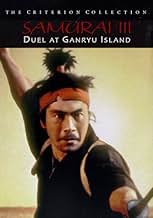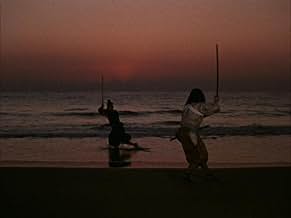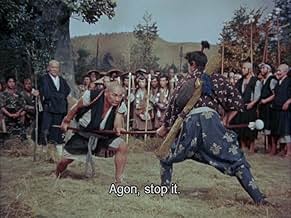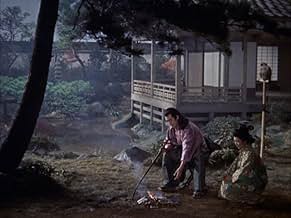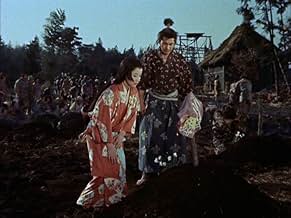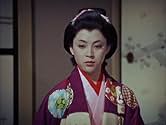La Voie de la lumière
Original title: Miyamoto Musashi kanketsu-hen: Kettô Ganryû-jima
- 1956
- Tous publics
- 1h 45m
IMDb RATING
7.5/10
7K
YOUR RATING
Musashi Miyamoto is challenged to a duel by a confident swordsman Sasaki Kojiro. He agrees to fight him in a year's time.Musashi Miyamoto is challenged to a duel by a confident swordsman Sasaki Kojiro. He agrees to fight him in a year's time.Musashi Miyamoto is challenged to a duel by a confident swordsman Sasaki Kojiro. He agrees to fight him in a year's time.
Featured reviews
I feel very confident and content once I finished watching the trilogy. What starts of a nothing end on greatness. Lots of things have been said in the movie about the humans, the way they live, they behave, they treat others and above all their desires grooved in the very depth of the heart. What is most likable is the mildness with which things are being said but every bit needs to be heard with full attention. After watching the trilogy I read the book written by Miyamoto (A book of five rings Must read) himself and got an inside more clearly.
Now the movies, all three are gems without a second thought. The acting, cinematography and above all the direction is very good. Emphasis on little things, shades of lights (sun is setting etc) and even water (streams, rivers) everything is perfectly matched with the movie to the core. Above all is the way Mifune enacted the role, the way he delivers the expressions for an arrogant in the first outing, then the confused man and in the last gentle, kind and wise person is extremely believable and I have no doubt in saying that I can't imagine someone else in the role.
A must watch trilogy.
8.5/10 (all three movies)
Now the movies, all three are gems without a second thought. The acting, cinematography and above all the direction is very good. Emphasis on little things, shades of lights (sun is setting etc) and even water (streams, rivers) everything is perfectly matched with the movie to the core. Above all is the way Mifune enacted the role, the way he delivers the expressions for an arrogant in the first outing, then the confused man and in the last gentle, kind and wise person is extremely believable and I have no doubt in saying that I can't imagine someone else in the role.
A must watch trilogy.
8.5/10 (all three movies)
This comment flows out from previous ones.
In cinematic terms, the trilogy looks to both East and West. West: the Hollywood western feel and tone of romantic adventure in a lawless land. Usually in a western this is rooted in landscape, the vast expanse of sky and desert that crystallizes being, which reflects Western notions of god. By contrast here, the landscape is fluid and dynamic: a recurring and important motif is transient bodies of water, and often bridges, human effort to ford time.
This is how each film ends, With these evocative shots of running waters as lovers part with the tides. The last shot leaves Musashi on a boat and we're unsure where the tides bring him next. Oh, a lot of the film is otherwise steeped in studio-lot artifice, you will often see for instance painted skies and sunsets.
The underlying visual inspiration is Japanese ukiyo-e. Buddhist- inspired in its original context, images (often of water or bridges) reflected this floating world of sorrows and melancholy yearning. We see this in Musashi's own journey of mastering self, reaching here the almost ascetic contentment of working the land.
Mizoguchi was more somberly portraying this floating world at the time. Later jidaigeki would more bitterly question the heroism and samurai devotion. Here it is a rustic, straightforward rendition in keeping with public perception of Musashi as a straight soul; so are the images, so is the drama. Handcarving, folk instead of high art. The iconography has been given specific care to emulate idyllic perceptions of Musashi's time.
So, a heroic story of romanticized legend, acted by a great Mifune, who like Musashi, had an intuitive rather than studied grasp of life. Told by referencing artistic tradition of that time which is romanticized by the same step, which is (roughly) the same distance in time to us.
---
The trilogy doesn't mine in a cinematic way Musashi's rich ideas about the 'Way', expressed in writing near the end of his life and passed on to a student. Musashi of course wrote on swordsmanship. Roughly speaking, his teaching is layered in the following way: realizing the many crafts as one, right technique, right strategy, refutation of flawed strategy, void as principle. (meant in the Buddhist way)
Musashi did not intend to establish a rigidly complicated system of study, but rather quickly sketch a practical handbook for the continuation of his school. He was not a learned scholar, nor from the Buddhist standpoint a spiritual master. His writings are not artistic. When he says 'cut the opponent with a void spirit', it is not metaphor, poetry or metaphysics. He is trying to distill an experiential state of mind.
The specifics of fighting do not interest us here, an abstract look at first principles should. The idea is that fighting before we even get to blows is two viewers coming together, establishing a situation. Referred to in the books as strategy, what Musashi is talking about is ways to manipulate the psychology of the situation.
Some it is makes amazing common sense, for instance approach the other feigning a lazy or weak demeanor then close the gap in the last steps with an explosive burst, what he calls 'getting someone drunk'. There are all sorts of this if you read carefully; 'passing on' mental states, creating mental states in the other, picturing yourself as the other, all to control and direct perception.
It seems what rules in these and other instances is the enigmatic 'twofold gaze', perception and sight. What can this be? Musashi does not explain, but I think it's this; grasping the difference and, ultimately, the inseparability of seeing and perception as the whole stageplay carried on in the mind's eye. Actually experience this. This is a bit like: sight is the calm lake before you while perception, the fact that a self is actively engaged in perceiving, a self which can experience fear or arrogance, is constantly throwing pebbles in that lake, distorting the surface.
We have similar notions in the West of how the latter bends the first. But Musashi is worth studying for the purely intuitive immediacy of the imports, it was after all something he learned as a matter of life and death.
This is observing dynamics instead of trying to decipher intent, theorizing. Fixing the eyes but not stopping the mind coming and going, cultivating an inquisitive and broad spirit. The idea is that none of this is an idea, but something that can be practiced and observed. That's also the Tao. The practice of perceiving the inner self of things through the outside form.
In cinematic terms, the trilogy looks to both East and West. West: the Hollywood western feel and tone of romantic adventure in a lawless land. Usually in a western this is rooted in landscape, the vast expanse of sky and desert that crystallizes being, which reflects Western notions of god. By contrast here, the landscape is fluid and dynamic: a recurring and important motif is transient bodies of water, and often bridges, human effort to ford time.
This is how each film ends, With these evocative shots of running waters as lovers part with the tides. The last shot leaves Musashi on a boat and we're unsure where the tides bring him next. Oh, a lot of the film is otherwise steeped in studio-lot artifice, you will often see for instance painted skies and sunsets.
The underlying visual inspiration is Japanese ukiyo-e. Buddhist- inspired in its original context, images (often of water or bridges) reflected this floating world of sorrows and melancholy yearning. We see this in Musashi's own journey of mastering self, reaching here the almost ascetic contentment of working the land.
Mizoguchi was more somberly portraying this floating world at the time. Later jidaigeki would more bitterly question the heroism and samurai devotion. Here it is a rustic, straightforward rendition in keeping with public perception of Musashi as a straight soul; so are the images, so is the drama. Handcarving, folk instead of high art. The iconography has been given specific care to emulate idyllic perceptions of Musashi's time.
So, a heroic story of romanticized legend, acted by a great Mifune, who like Musashi, had an intuitive rather than studied grasp of life. Told by referencing artistic tradition of that time which is romanticized by the same step, which is (roughly) the same distance in time to us.
---
The trilogy doesn't mine in a cinematic way Musashi's rich ideas about the 'Way', expressed in writing near the end of his life and passed on to a student. Musashi of course wrote on swordsmanship. Roughly speaking, his teaching is layered in the following way: realizing the many crafts as one, right technique, right strategy, refutation of flawed strategy, void as principle. (meant in the Buddhist way)
Musashi did not intend to establish a rigidly complicated system of study, but rather quickly sketch a practical handbook for the continuation of his school. He was not a learned scholar, nor from the Buddhist standpoint a spiritual master. His writings are not artistic. When he says 'cut the opponent with a void spirit', it is not metaphor, poetry or metaphysics. He is trying to distill an experiential state of mind.
The specifics of fighting do not interest us here, an abstract look at first principles should. The idea is that fighting before we even get to blows is two viewers coming together, establishing a situation. Referred to in the books as strategy, what Musashi is talking about is ways to manipulate the psychology of the situation.
Some it is makes amazing common sense, for instance approach the other feigning a lazy or weak demeanor then close the gap in the last steps with an explosive burst, what he calls 'getting someone drunk'. There are all sorts of this if you read carefully; 'passing on' mental states, creating mental states in the other, picturing yourself as the other, all to control and direct perception.
It seems what rules in these and other instances is the enigmatic 'twofold gaze', perception and sight. What can this be? Musashi does not explain, but I think it's this; grasping the difference and, ultimately, the inseparability of seeing and perception as the whole stageplay carried on in the mind's eye. Actually experience this. This is a bit like: sight is the calm lake before you while perception, the fact that a self is actively engaged in perceiving, a self which can experience fear or arrogance, is constantly throwing pebbles in that lake, distorting the surface.
We have similar notions in the West of how the latter bends the first. But Musashi is worth studying for the purely intuitive immediacy of the imports, it was after all something he learned as a matter of life and death.
This is observing dynamics instead of trying to decipher intent, theorizing. Fixing the eyes but not stopping the mind coming and going, cultivating an inquisitive and broad spirit. The idea is that none of this is an idea, but something that can be practiced and observed. That's also the Tao. The practice of perceiving the inner self of things through the outside form.
This was, by far the best of the trilogy and a fine ending. It had less Samurai action that the other two, but it was much more inspiring.
Kojiro (Koji Tsuruta) thought himself the best in the land and sought a duel with Musashi (Toshirô Mifune). But Musashi wanted to devote his life to becoming a better person. he went back to the land that he rejected and became a farmer.
In the meantime, both Otsu (Kaoru Yachigusa) and Akemi (Mariko Okada) managed to find him. Can you imagine that scene? Feeling rejected, Akemi is made to betray Musashi to the brigands. The effort fails and Musashi accepts the duel with Kojiro.
The duel itself was magnificent but short. It was a fitting end to a film that featured outstanding cinematography and a compelling story of the drive to perfection.
Kojiro (Koji Tsuruta) thought himself the best in the land and sought a duel with Musashi (Toshirô Mifune). But Musashi wanted to devote his life to becoming a better person. he went back to the land that he rejected and became a farmer.
In the meantime, both Otsu (Kaoru Yachigusa) and Akemi (Mariko Okada) managed to find him. Can you imagine that scene? Feeling rejected, Akemi is made to betray Musashi to the brigands. The effort fails and Musashi accepts the duel with Kojiro.
The duel itself was magnificent but short. It was a fitting end to a film that featured outstanding cinematography and a compelling story of the drive to perfection.
I have seen the three films in one shot, and I have to say: AMAZING ! Samurai's life is a must know: honor, proud, philosophy it was a way of life. The three films from Inagaki are really great: good photography, well directed moving camera, it really seems that you are eating rice in the middle of the 17th century in Japan. This is also due to the language, its japanese...yes Japanese, but doesn't matter because it's better ! The strength in the talks are only comprehensive in the native language. If you like adventure, historical, romance or action movies you MUST see this three films (cannot be considered one to one). Inagaki received the Oscar in 1955 for Samurai I, thats all. And enjoy!
Samurai III: Duel on Ganryu Island is the closing film of Inagaki's Samurai trilogy, the story of Musashi Miyamoto (Mifune). It is one of the best samurai films on its own and has the advantage of having the characters' history established in the first two films of the trilogy. This film abounds in good characters: Musashi's two disciples, a young boy and a horse trader, who exchange good natured barbs and loyally support Musashi; the two women in Musashi's life, good girl Otsu and bad girl Akemi; the brigand leader and his henchman, who was formerly Akemi's stepfather; and of course, Musashi's nemesis, Kojiro Sasaki, who is outstanding in both this film and Samurai II. Kojiro is actually a more interesting character than Musashi and reminds me of Tatsuya Nakadai's performance in Sword of Doom. The climactic duel on the beach with the rising sun in the background is amazing. Side note: This film has four of Kurosawa's Seven Samurai actors: Mifune, Shimura, Kato and Chiaki. See the whole trilogy.
Did you know
- TriviaThis film is part of the Criterion Collection, spine #16.
- GoofsAs the final duel is fought, the duelists have light on the sides of their bodies away from the sun - Sasaki has light on his back and Miyamoto light on his face.
- Quotes
Musashi Miyamoto: Brace up, Akemi.
- ConnectionsFeatured in Sayonara Jupitâ (1984)
- How long is Samurai III: Duel at Ganryu Island?Powered by Alexa
Details
- Release date
- Country of origin
- Language
- Also known as
- Samurai III: Duel at Ganryu Island
- Filming locations
- Production company
- See more company credits at IMDbPro
- Runtime
- 1h 45m(105 min)
- Sound mix
- Aspect ratio
- 1.37 : 1
Contribute to this page
Suggest an edit or add missing content


